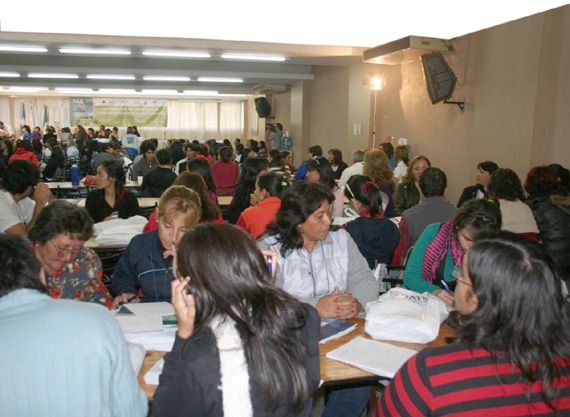Carolina Llanos, is secretary of women’s
issues and country coordinator of the
National Women’s Network of the
Argentine Union of Rural Workers and
Stevedores (UATRE). She plays a leading
role in developing the Rural Literacy
Program (PAR). SIREL interviewed her at
the closing of the 9th PAR Training
Symposium.
-How would you describe the events of
the 9th Training Symposium?
-Simply excellent! I would like to point
out the great commitment shown by
facilitators, who had a great attitude
and were willing and able at all times.
And that’s very encouraging. We should
also mention that some participants
traveled for over 18 hours by bus in
order to be here in Buenos Aires.
-How many literacy centers are currently
functioning?
-There
are exactly 308 centers.
And some people are asking for the
possibility of opening more centers. So,
it’s possible for that number to
increase.
-How many men and women have learned to
read and write with this program?
-As of 2009, we were well over 30
thousand. Now, with the new people
registered in 2010, we should go beyond
40 thousand by the end of the year.
-Do they join the Union and participate
in its activities once they’ve learned
to read and write?
-Most of them do. Women, for instance,
join
UATRE’s Women’s Network,
to the point of becoming politically
active within the organization. Many
women who participated in the
PAR
program are now leaders in their
hometowns, where they join associations
of rural women or take part in the
activities of our branches.
Also, they participate in
UATRE’s
activities. They are at the frontline of
each event. They come up to meet
Venegas
(Gerónimo),
and tell us that they participated in
the workshop in such or such year …
-The literacy program acted as a
triggering element, and the men and
women who participated in it are now
looking to do more, I imagine …
-That’s for sure! People feel motivated
and as a result become more active. And
this encourages us to seek yet other
spaces for studying, for working and for
citizen involvement.
-Is there anything the new literates
have said to you, in expressing their
gratitude towards UATRE, that you
remember in particular, that you’ve
cherished?
-Many
of them have said it was like pulling
down a blindfold, and we think that’s
quite significant. I remember a woman
who was part of the literacy program and
is no longer able to write due to the
arthritis in her hands. But today, with
over 90 years of age she reads the Bible
every day, which was something she
longed to do for many years.
I also heard something quite from this
other woman who used to always bring to
the workshop a letter she had received
from her son a couple of months before.
By the end of the program she was able
to write back to him on her own, saying:
“Guess
whose writing this is?”
That was how she began her letter.
It’s their personal experiences that
move us to the core and overcome us with
emotion. And that’s what makes it a
great pleasure for us to be able to
implement these literacy programs every
year.
But, like I said, we look forward to a
time when we won’t need to do this
anymore, for that would mean that there
are no illiterate people left in the
countryside.
